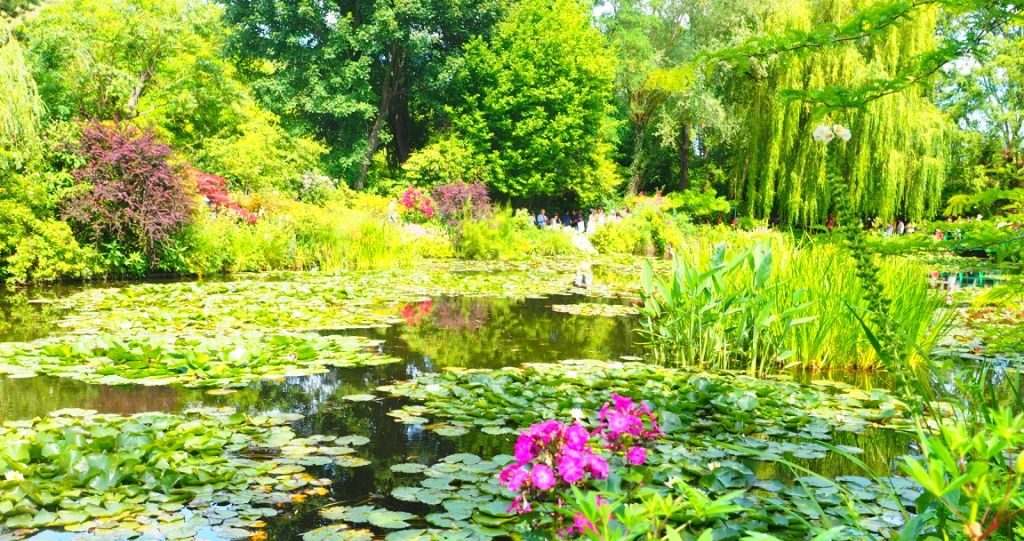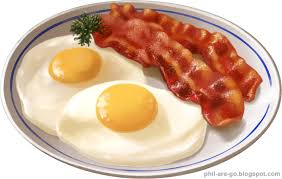How would you like your eggs?
Standard question in any western breakfast menu.
Well I have always loved eggs any way – boiled – soft..hard…hot…cold – scrambled…poached and my favourite – fried in butter …and a side of crispy bacon …cholesterol heaven!!
But since I have been in China this love affair has stalled!
Its like the period before the breakup- haven’t told him yet but am pretty sure we are done!
So what is this issue you are having with eggs? I can hear you ask…eyebrows raised.
Well let me tell you …
Eggs here come in all different colours and sizes…..and cooked in many a splendid way!
There are of course ‘normal’ eggs and you can get them fried or scrambled to include in any rice or noodle dish – delicious..and they use eggs as part of making their breakfast wraps which are to die for..
I have discovered that I am in fact a little conservative in one part of my life!
I cant manage boiled eggs in China!
How can that be? … after all to cook an egg you just need to put the egg in water, bring it to the boil and voila you have a boiled egg!
But this is China and things are not always the same in China!
Tea Eggs
To make a tea egg you boil the egg, then crack the shell in multiple places and then continue to boil in tea, sauce and/or spices. Sometimes these eggs are boiled all day….
These eggs are referred to as fragrant and flavourful tea eggs and are a traditional Chinese food. They are really popular and sold everywhere – fresh by local vendors and vacuum packaged for the supermarket industry.
The original recipe uses various spices, soy sauce, and black tea leaves. A commonly used spice for flavouring tea eggs is Chinese five – spice power which contains ground cinnamon, star anise, fennel seeds, cloves and peppercorns.
Some times they are boiled the second time in just black tea or even green tea.
The eggs not only come out an ominous grey colour… they also smell in a really smelly egg way…
Not my cup of tea!
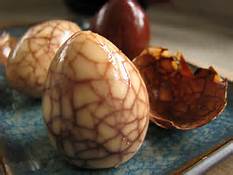
Salted duck egg
The salted duck egg is considered a speciality food in China and is made by soaking the eggs in brine and then packing each egg in damp salted charcoal.
From the salt curing process, the salted duck eggs have a specific smell, the egg white looks like jelly rather than a firm egg white and the firm-textured, round yolk is bright orange/red in colour.
The egg white has a sharp salty taste and the yolk is quite fatty but less salty
It just looks wrong!

Century eggs or hundred year eggs
According to some, the century egg has over five centuries of history behind its production.
Legend has it that 600 years ago in Hunan during the Ming Dynasty a homeowner discovered duck eggs in a shallow pool of lime that was used for mortar during construction of his home two months before.
Upon tasting the eggs, he found them to be preserved he found them to be rather tasty.
He set out to produce more — this time with the addition of salt to improve their flavour, resulting in the present recipe of the century egg.
Over time this method became common place – coating eggs in alkaline clay in times of plenty for times when food was scarce… the clay hardens around the egg and this results in the egg ‘curing’ inside the shell rather than spoiling.
This practise was also common in some Western cultures.
Today such eggs are made by using a chemical process which includes a mixture of clay, ash, quicklime and rice hulls. The eggs are ‘cured’ for several weeks to several months and then delivered to vendors across the country.
When you open the egg it comes with a sulphuric smell that violates the nostrils and it looks like rotten black jelly
I’m done!
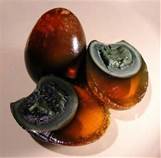
Fertilised Eggs
Fertilised duck eggs are a very popular snack, appetiser or beer food. The contents are much harder than a conventional boiled egg, with a partially formed duck foetus inside.
Popular condiments include lemon and black pepper, fresh herbs, pickled veggies, raw garlic and green chili.
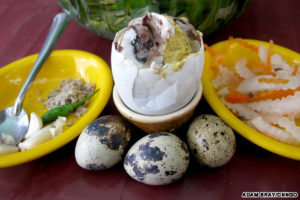
I am done – I am really done!
So yep … my love affair is pretty much over and I cant look an egg in the face anymore…
Happy Bumbering!
